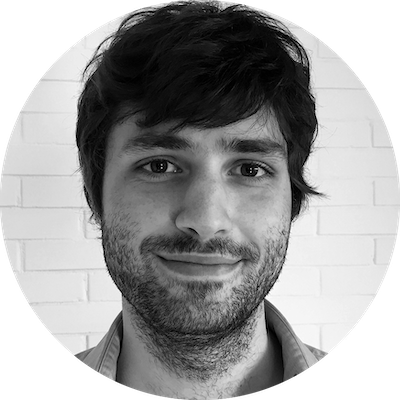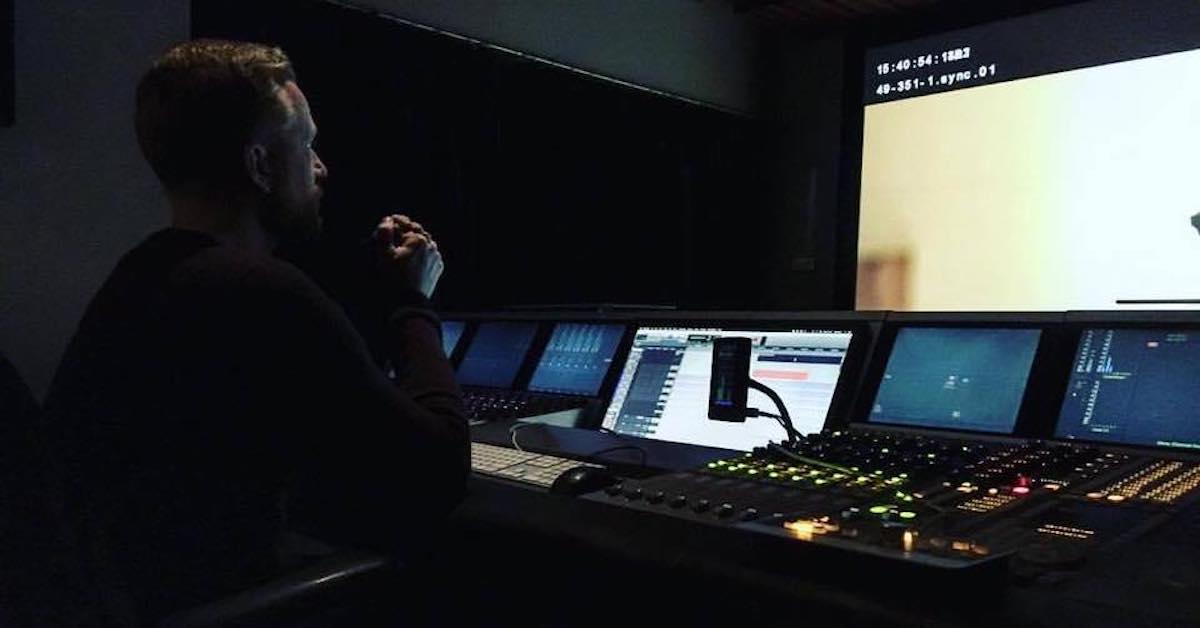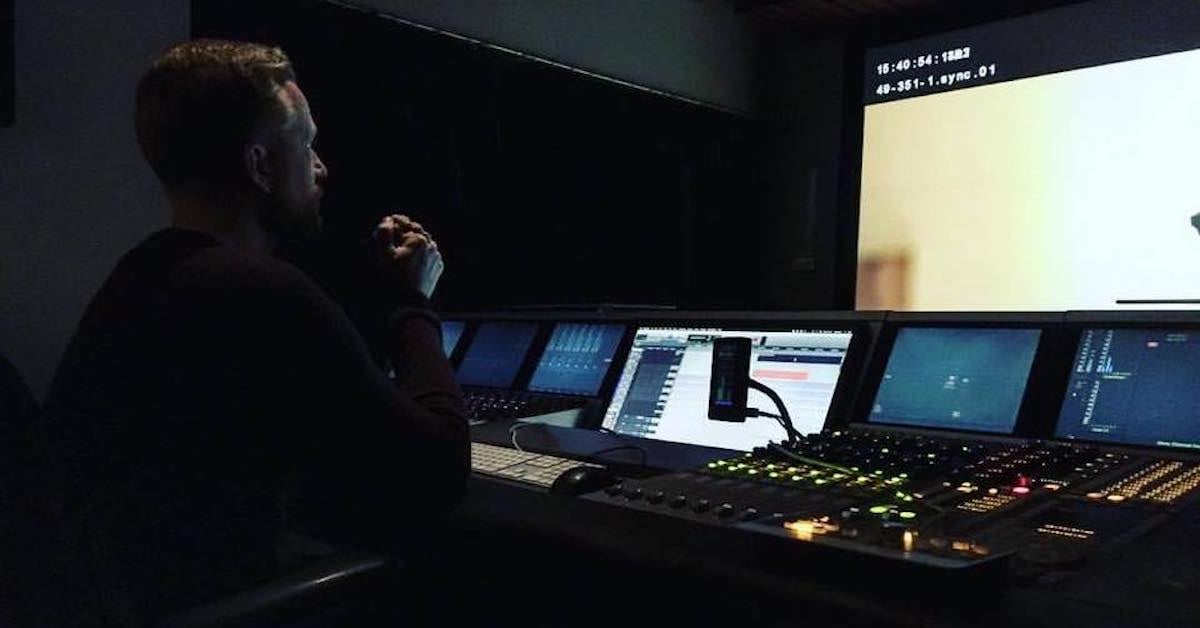
Learn how every sonic detail can tell a story, and get advice on how to break into the audio post production industry.
In a career spanning only six years, sound designer and sound fx editor Enos Desjardins has already managed to work on major TV shows like Black Mirror and several feature films – in addition to winning the 2016 "Best Sound Design: Short Film" Music and Sound Award for his work on Food for Thought.
We had the chance to catch up with Enos to discuss his strong focus on how story informs sound design, finding new work, and his approach to the audio post production process. Read our in-depth conversation below.
How did your career start?
Enos Desjardins: I grew up playing drums and bass in bands then moved to Manchester in 2007 with the idea of studying to become a studio engineer. We had a module in film sound which I felt married to both the technical side of audio as well as the creative side of it with the added element of storytelling. It was similar to working with music in a way but at the same time very different. It felt very personal.
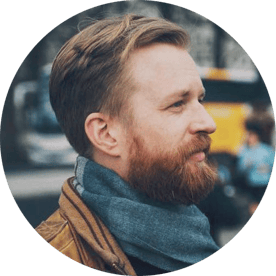
Late in my studies I had a lucky break. I'd been following a blog called Music of Sound by Tim Prebble, a sound designer based in Wellington, New Zealand, and he put a call out to take on a virtual intern. I got selected alongside Michal Fojcik who is now a top supervising sound editor and sound designer in Poland.
Over the next year we learned a lot about film, especially in terms of storytelling, analyzing scripts and understanding the use of sound. We focused on sound editing, the business side of things, but mainly we focused on the importance of story and the role of sound in it. He was very serious about the importance of recording our own sounds, even if it meant using some cheap handheld recorder. As you know he has his library company HISSandaROAR and he's a great sound effects recordist.
When reading a script how do you start thinking about your way to tell story through sound?
I guess the script has to talk to you. The last few years I've been reading books about storytelling and screenwriting. I feel like understanding story structure and the thought process of writers is very relevant for us as sound designers because once you understand the structure of the story and the character arcs then you start knowing what to look out for in a script and how to decipher the main elements of the story. What's the character's journey? Where are they coming from and where are they ending up at the end? Then you start thinking, "How could I convey this with sound?" You starting thinking about it as a composer I guess, with motifs, instrumentation, aesthetics, and so on.
Sometimes this means creating some almost musical elements like musique concrète design stuff. Other times you're kind of focusing on small details like the slow evolution of someone's Foley performance from, say, insecure to confident. Even footsteps can tell a story and support a story arc. If you take that as a basis then pretty much any sound can be used and evolved in support of the story.
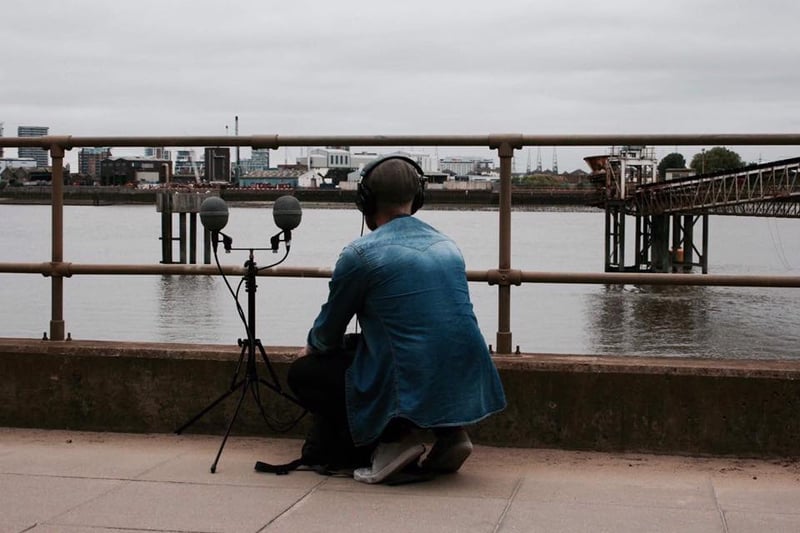
Do you ever find yourself reading a script and thinking “there is not much to do creatively here”?
Sometimes you read a script and feel like no ideas come to mind straight away. It doesn't necessarily mean there is not much to do creatively of course. But as much as sound can contribute heavily in some films, in others it can be much more light and sparse. I think you have to do whatever the film needs and that's why understanding what that is is so important. Sometimes you can ruin it by trying to do too much, you know?
There are scripts I read where things are jumping off the page in terms of sound ideas. Other times, even though the script is really good, I have minimal ideas in terms of sound. But even then, once you actually get into project later on, things will come into focus. I try and write down notes on the script as I'm reading. Just little scribbles and stuff so I can go back later and start digging deeper.
When you talk to directors about following a character’s arc and telling a story through sound, do you find that they usually relate to that or is it more of an afterthought for them?
I'd say maybe 70% of directors I've worked with are initially unaware of the potential of what sound can do for their story beyond its obvious practical applications.
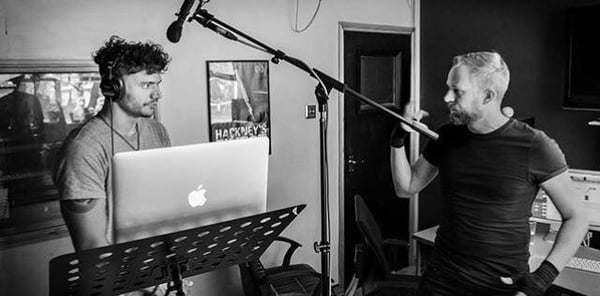
It’s just something they might have not explored before, it’s not that they are bad directors.
Absolutely. I think this true deeper role of sound is not taught enough in film schools. A lot of people are unaware of the role of sound beyond just recreating reality. You know, see a door, hear a door. I love that part of my job as well and would say that 50% of the process is re-creating and enhancing the reality of the world the film takes place in. But the other half is the narrative side and supporting that. I think by the end of the project most directors I've worked with discover the true role of sound. Usually if we end up working together on their next project then it's a whole different experience. They get it. I'm on board a lot earlier. I did a film not long ago called Food for Thought. The director Davide Gentile is developing a new project now which is in writing stages, but he already has me in the loop.
I always think it’s our role as sound designers to sort of preach this gospel of sound. Becoming a tool in their writing process too. It can add so much to projects. And I usually don't get any extra money for being involved earlier, but it also isn't a big time commitment. It usually involves just being part of the conversation or being sent a script draft now and then which I'll read before going to bed at night then have a Skype call with the director or a chat over a coffee as they're writing and talk about things. It's not like you're blocking out weeks of time to do this.
Sometimes you have a discussion which triggers an idea which then makes it into the script or affects the direction something takes. Other times I'll read a script draft and be like "Wow this script is really cool but I don't have any cool thoughts to add right now." That's fine as well. The important thing is being part of the process. Otherwise you never know what opportunities you may miss.
"Understanding story structure and the thought process of writers is very relevant for us as sound designers because once you understand the structure of the story and the character arcs then you start knowing what to look out for in a script and how to decipher the main elements of the story."
Does your input ever get incorporated into the script?
In the case of Food for Thought I hadn't actually contributed to Guen Murroni’s script directly when she was writing, but then had discussions with the director over the storyboards, suggesting some props and certain shots ahead of the shoot. I talk with directors or writers to think about what their characters are listening to or what sonic world they're in. What is going on sonically in this scene and how can this affect how the characters? Can we insert a physical object or prop into the scene that has a sound that we integrate into the story somehow? If you want sound to do some specific creative tasks you need to establish the source. That was the whole thing with Food for Thought. The clock thing, the neon lights.
If those props are not visually established, their sound might just throw people off and it’s not going to have the same impact.
Yeah, exactly. You don't have to keep cutting to them, but a single closeup can make all the difference. Early on in Food for Thought we have shots establishing these elements that sound is going to play with later in the film. There's a moment where we transition into the character's head, into his sonic POV. He's hearing all these people eat and make all these noises that he's finding gross. At some point that triggers him to go into this hyperreal mode. For that to work, we cut from the girl who sips in some milkshake with a straw, so we have a shot of her and then a classic straw suck sound and then that continues to the next shot, and we have a shot behind the main character's head with the camera pulling in. So visually, we're telling: here's a sound, we're connecting that sound to the next shot and the next shot visually telling us we're going into his head. During that same shot the sound is now morphing into different textures, and suddenly for the audience it's very clear: okay, shit, this sound is triggering something in his head and we are shifting into his POV sonically. There's no confusion. But if you didn't have those shots, you couldn't just have a wide shot and then do this sound transformation. It would be kind of weird. Many directors will get this, but as sound designers we will imagine a scene differently, or will have some concerns based on issues we have had in the past and can suggest solutions they may have not thought of.
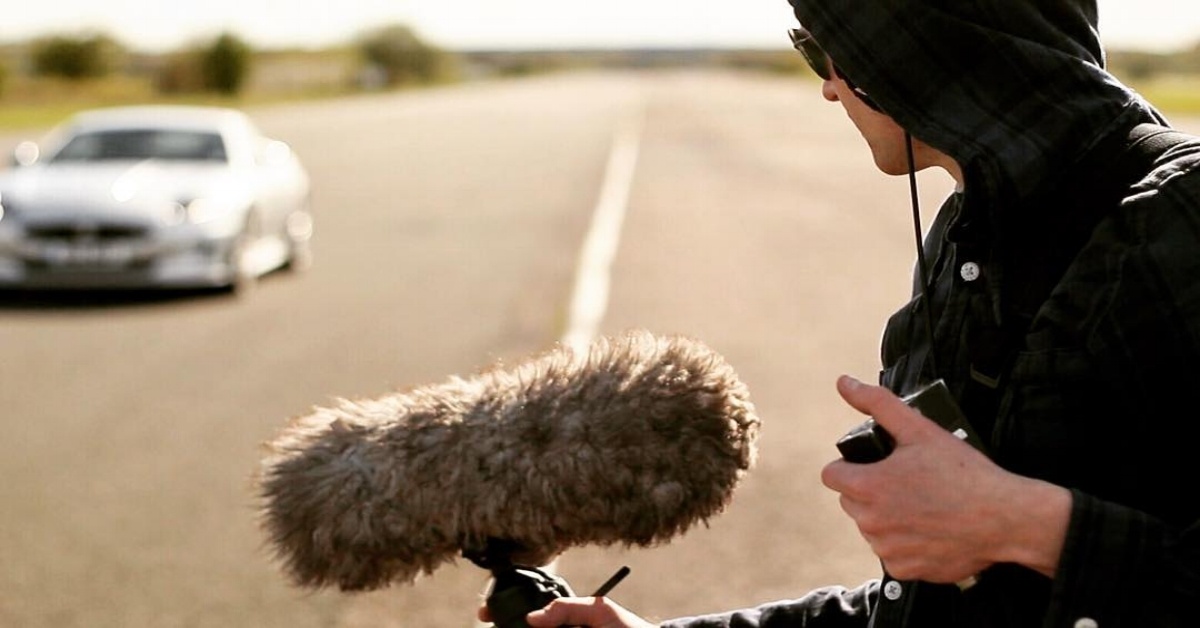
I feel like the picture editor is usually my best ally as they understand that 100% of the times.
I totally agree. For me the picture editor is probably one of the closest relationships we can have as sound designers. On Food for Thought it was Tommaso Gallone, who has also worked as an assistant picture editor on many big movies by Paolo Sorrentino and Joe Wright, like Darkest Hour starring Gary Oldman. Before he started the edit I sent him a small sound effects library that I had put together based on the script so he had a bunch of stuff to start working with. By giving him my sounds, he ends up using something that's a bit closer to what I will be using later. It's the equivalent of a composer sending some early cues or concepts for the editor to cut with as opposed to them using some existing temp score from another film.
How do you usually transition into new projects?
Usually all the commercials I do are with directors that I've done films with before. The director of Food for Thought is a commercials director. With his first short film he wanted to work with me as I did films. Same applies to a few other directors.
In the last few years episodic TV content has become a much bigger thing. Here in the UK it used to be that if you worked in TV you'd only do TV stuff, and if you worked in film you'd always do film, which was always seen as a slightly artistically superior form, right? But now it doesn't mean anything anymore. Big platforms like HBO, Netflix and Amazon are becoming like studios doing these big shows like Game of Thrones or Black Mirror that have really high production values and are really getting big audiences. That's shifted things a lot. Now it's very common here in the UK for film sound designers and sound supervisors to work on these TV series as well. The same for directors. I just finished doing some work on a show called Trust for which Danny Boyle is the showrunner and has directed some of the episodes. He's a huge film director, but for him to be doing an episodic thing like Trust is interesting, because having 10 or 20 hours instead of 2 or 3 to tell a story, that must be quite appealing.
You have only entered the industry six years ago, yet you have accumulated an impressive body of work. How did Black Mirror and Trust come about?
I don't know how it works in the US, but definitely here in the UK we don't have agents - I don't have anyone looking for work for me. It's all completely relationship-driven and word of mouth. People you know, people that recommend you and people that work with you and want to work with you again. After a while you look back and everything is connected via someone you've worked with, or someone who has recommended you to someone else, etc.
When I moved to London I had several supervising sound editors that I looked up to and I tried to connect with. One of them was Joakim Sundström. I find his work super interesting and super cool. Last year he did Three Billboards Outside Ebbing Missouri. He has a regular team of people he works with, but as I had managed to meet him at one point he got in touch one day and was like, "Hey man. I'm doing a miniseries. It's a smaller budget thing but maybe this could be a good opportunity to work together for a few weeks." So I did that which then ended up being mixed by Howard Bargroff who is one of the main TV mixers in the country. I did not even attend that mix but shortly after Howard got in touch saying he was supervising and mixing a TV series called Marcella and asked if I would be available to do a effects editing on a few episodes. Then a year or so later Joakim called me and said, "Hey man, I'm doing an episode for Black Mirror and I thought you'd be the perfect person to do these robot dogs" and I was like, "Wow! Black Mirror is so cool, I'm a massive fan!" So just from that one project, the next two new projects came. Then that same year I was working on a few episodes for the second season of Marcella with Howard Bargroff again and just as I was finishing he said "Hey. What are you doing after this? I've taken on this Danny Boyle TV show." I was like, "Say what? Hell yeah!" So I did three episodes of that as well. You just sort of do these things and then suddenly you look back and see how the dots connected. It’s really unpredictable but cool.
The important thing is to just keep doing stuff no matter what the level of production is and never underestimate the people you work with even on the smallest gigs. Always value the relationships you build, whether it's a director, a producer, a picture editor, an assistant editor, an assistant picture editor, a composer, a post supervisor. I've got calls from editors and composers I had worked with on a film where they loved the way things came together and they're like, "Let's work together again!" Sometimes it’s the most unlikely people that you end up getting a call from. When you're starting to work in the industry you kind of say, "Oh, man. I would love to work on a Fincher movie, or a Tarantino movie," but it's not going to happen. The sound designers that are working with them now were not big at the time. They were just the people that happened to be there at the right time in the right place and in those circles. The exciting thing is thinking that any of the people you're working with could be the next Tarantino, the next Sorrentino, the next Spielberg. That's why it's important to value all those relationships, you know? Because I'm never going to work with Spielberg, but I'll work with the next Spielberg maybe.
Do you do any remote work?
I do some remote work, yeah. Most of my productions are London or UK-based but I've worked with some projects in European countries and some US stuff. I'm fully freelance and I have my little studio in London where I work from. Essentially a lot of the projects I work on, even local stuff, except for the spotting session at the beginning and maybe attending the mix, it's all remote in a way. They'll upload files to me, I'll upload sessions back. I'll upload Quicktimes with work in progress and they'll Skype back. For a lot of the process I may as well be in Thailand and it wouldn’t change a bit.
You think directors are OK with working remotely after you have established a relationship?
I think once you establish connections then you can much more easily work from somewhere else and maybe just fly in occasionally for certain key moments. I think it depends also on what you do. If you're a supervising sound editor, or even doing sound design and effects and stuff, for at least part of the time you need to be where the director is. Obviously for the mix you have to be in the room if you're the mixer or if you're the supervising sound editor. For the spotting sessions as well. But for example all the Foley people I work with work outside of the UK. Tapio Liukkonen, he has a Foley stage in Finland. The internet has really connected the global sound community. It’s exciting.
You attend quite a lot of film festivals, is it just for fun or also for public relations?
I've been working my ass off over the last six years. You know, the post-production world can be quite a tough one in terms of hours and can take its toll in terms of personal life. I have lost and sacrificed things because of this. Relationships, moments, and what not. I wasn't always conscious about making those sacrifices at the time but then looking back, would I do it again? On the other hand maybe deep inside I’m so passionate about sound that without realizing I did sort of put my priorities in my career which has consequently started taking off.
One of the things I've realized in the last couple of years is that I need to improve my balance of life and work. Even within work, varying it up a bit and doing things like film festivals which are fun but also work related. I've been trying to go for years to at least the European ones like Cannes and Berlin. You get to watch films sometimes that might never come out but get a festival run, which is great and you get to meet new people. Directors and producers with cool visions. So I'm making an effort to go more to festivals now.
You are a freelancer working out of your own studio. When working on larger projects are you required to move to larger facilities or do you still work from your place?
At least here in the UK, over the last 5 to 10 years, more and more companies have got rid of their in-house editorial staff. It seems to be that a lot of the facilities have focused on having a place that they can hire out to productions as opposed to having a whole in-house team of people. It's less and less common now to get given studio space, so most of the projects I do, including the bigger ones, I'll go to the facility for all the client-facing stuff, reviews, spotting sessions and mixes, but the actual editorial work I’ll do on my own. They usually expect me to have a place to work from.
"The less you have, the more creative you're going to be because you have less options to go to, so you'll have to use your imagination more. Don't use lack of resources as an excuse not to do something."
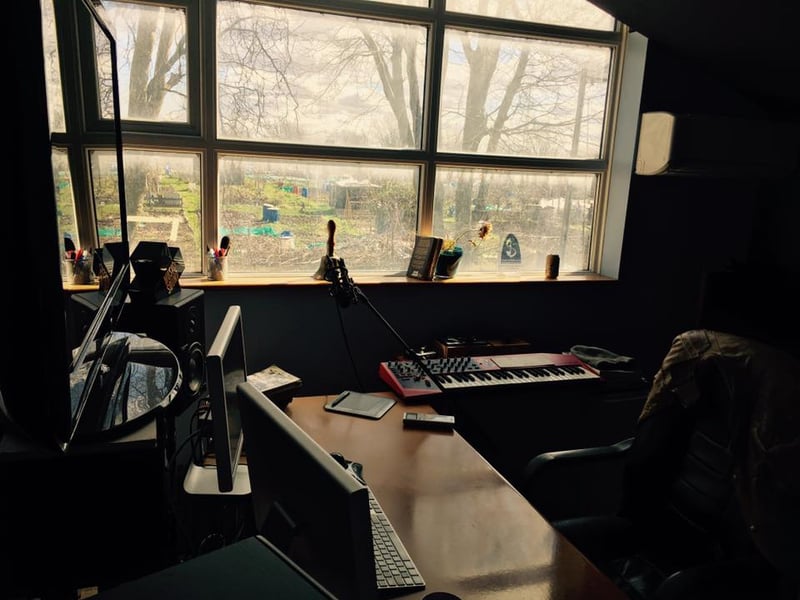
It seems though that as much as technology democratizes the process, the need for professionals to do a proper job won’t go away.
Absolutely. This is a creative industry. We are not just doing a mechanical task that can be replaced by technology. The landscape is changing too. I can do so much of my work on a small system in a smaller room now. I can even pre-mix stuff in my edit suite to a decent standard which in the past you physically couldn't do because you wouldn't be able to run all the tracks. For theatrically released stuff we will always need larger mix stages to do final mixing in and for me it is so important to have that but lines have blurred a lot between the phases of a project and between roles even.
What is your setup and what are your favorite pieces of gear?
Monitoring wise I have 5 Dynaudio BM6A MKIs which I love. I don’t have a sub, partly cause I never bought one, but partly because final mixes happen on a big stage and they translate differently. I do send stuff to the LFE channel when I’m editing or pre-mixing but I leave it to the mixer mostly. I run Pro Tools HD on a 2010 cheese grater Mac Pro and an Mbox Pro 3 which for now is still running solid. No outboard stuff except for a Kyma Pacarana system. I also have a sound effects recording rig consisting of a Sound Devices 744T recorder with a MixPre attached which gives me 4 nice preamps. My mics are a pair of Schoeps Colette ORTF-style and a Sennheiser MKH 30 and MKH 60 combo as my MS rig. I also have a few cheaper mics that I don’t mind getting trashed when recording car engines and things like that. I also have these two miniature mics called Uši by LOM and and an electromagnetic mic which captures RF called Elektrosluch, also by LOM. In terms of plugins I use a lot of the classics, SoundToys, GRM Tools, FabFilter, Cedar DNS, all The Cargo Cult stuff like Slapper and Envy. I don't use much synth type stuff. I work from a base of natural sounds and effects recordings and process those.
What does your process usually look like on a TV show or a feature from the moment you are hired to the moment you deliver?
If I'm supervising the ideal place to start would be having involvement really early on. Getting early drafts of the script and having conversations with the director. Then, closer to the shoot, having a chat with the director, alongside some of the costume or prop departments if we're suggesting certain things. Then it can be interesting to get sent a shooting schedule so if you get access to certain props or vehicles that they've got for the shoot you might be able to go out and record them, like if they're using a car that is quite specific. It's also nice for the producers, because for the same money, instead of just being parked somewhere for half the day you can just grab it and go record it somewhere saving them potential money down the line. Other times if they've got a day on set with 80 extras and I know I want some crowd stuff then I can maybe go and record that, because if you had to do that later on in post-production, it would be prohibitively expensive. So early involvement is not only creatively beneficial but logistically and financially too.
After that, usually you wait till you get a picture cut. The lower the budget, the more I try and wait for the picture cut to be as locked as possible. If there's more money and time, then it's nice to start earlier, even if it means having to re-conform more often. So usually what happens is at some point we agree that there's a version of the edit that we're going to start with, and then the picture department do the turnover which includes all the Quicktimes, AAFs and EDLs. The dialogue editor will take the EDLs and start conforming all the original rushes to recreate the audio timeline, and then they'll start doing their work of dialogue editing and eventually ADR. Then around the same time, If I'm supervising, I'll do a Foley spotting session which I'll send to the Foley team as a Pro Tools session.
I'll then start doing my effects pass, including backgrounds and spots. Usually it ends up being around the same time as the Foley editors. I try and get the Foley team to start doing all the props first, as opposed to the feet and moves. The reason being that very often there's a gray zone of what's sound effects and what's Foley. Usually when I get the Foley I have to readjust it to whatever timing I've chosen for effects or vice versa, and also sometimes I've spent time doing Foley type stuff that they can simply do better. So if they can do their props first and send it to me, even like one reel at a time, then once I've done my background I can start doing my effects and I'm working them in with the Foley. It also means in terms of Foley editing, by the time we get to premix, everything is kind of nicely tied in together. Also, I make sure that no one's missed anything, so it's kind of a nice way to work, I find.
Then at some point usually there will be re-cuts and changes, so then we all re-conform our sessions using stuff like EdiLoad or Conformalizer. This can happen sometimes once during the project or 10 times. It happens less in TV I find because it's quite a tighter schedule. Here in London, you get two weeks per episode for effects on a 45 minute to one hour show. I've heard that a lot of people in the States get one week, which is crazy whereas on an indie film you maybe get minimum four and easily six, seven, eight weeks for effects. On a big film, even more than that. A normal indie film will maybe be 90 minutes, and a TV episode will maybe be 45 to 60. So there's not that much more, considering you get so much less time.
In terms of mixing too. On a feature you may have anywhere from 5-10 days on a smaller indie film up to 8-12 weeks or maybe more on the big films. On TV it’s common to get three or four days to mix an episode.
In a one mixer setup?
One mixer, yeah. But you know, when I deliver the effects my session is essentially premixed. I always check with the mixer first to see how they want things. But I will usually do volume automation, some basic EQ, panning and even reverbs. If I'm doing volume automation I usually try and coalesce it to clip gain at the end. I don't want the mixers to have to jump on the desk and their faders are flying all over the place.
Are you editing sound effects in the mixer’s template or do you deliver food groups?
I work within his or her template both in terms of track layout and in terms of plugins. Like making sure I'm using the same EQ and that it is on the same insert slot. If I'm supervising, then I get to choose whatever, but if I'm working for another mixer then ultimately my tracks have to be delivered to that person, so I always ask them.
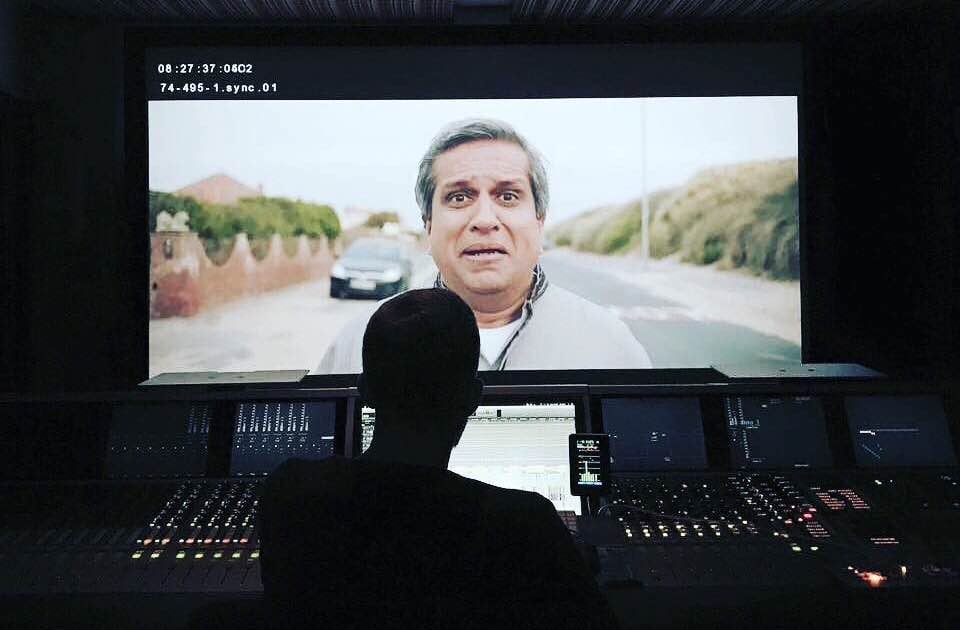
How do you get creatively unstuck?
I'll stop working on the scene and just go and play with some sounds in another space, like I'll just go to Soundminer and start listening to stuff, or I'll just start playing around in Reaktor or any of these design playgrounds and use some sounds that are potentially related to that scene, but not really doing it for the scene. Sometimes suddenly something will come up and you get excited because you're having fun and then suddenly you unblock it.
Also, just allowing yourself to have fun instead of stressing about it and trying to force yourself to get an answer straight away. Either move to something else for a bit, or just go off for a walk or have lunch, or just play on something. There's a piano here in the studio, so quite often I'll just go and sit on that for 15 or 20 minutes, then I’ll feel a bit refreshed and when I come back I’m no longer in a blocked, stressed mood. It works.
How do you deal with material that is flawed by bad writing, directing or editing?
Yeah. Not much. I mean, bad writing you can't really fix. You can help edit issues at times for sure. Because we're usually the last stage in the process the final mix is like the first time the director is experiencing their movie in its near final state. So sometimes that's a great thing because it's this moment of excitement where like, "Wow, we've made a movie!" Other times it's like, "Ah shit, this is really terrible." I've seen directors break down and nearly cry on the mix stage and be like, "This is shit. I've just wasted two years of my life and everyone's time to make this." And they're not even bad films. They're just so tired by then that they lose objectivity and sometimes you become the last hope to try and fix things, even if there's no way you can fix anything.
What projects are you currently working?
Right now I’m finishing deliverables for a feature called Eaten By Lions which had its world premiere at the Edinburgh Film Festival. Also I’m coming down of the excitement of this feature that I have just finished which has been the biggest supervising job of my career. It’s a Netflix Original called Close starring Noomi Rapace.
What advice would you give to people trying to get into your field of work?
Keep working. It sounds cheesy, but it's the truth. I think the most important thing is to just keep yourself busy doing any level of stuff. If you haven't got a project, then play with some sounds or go out and record some sounds. If you've got a project, even if it's no pay and not the most exciting thing, do it. Make sure you're not stopping because when opportunity comes you've got to be ready to do top stuff.
Also, don't wait to have the best machine or plugins. Do the best you can with the stuff you've got at the time. The less you have, the more creative you're going to be because you have less options to go to, so you'll have to use your imagination more. Don't use lack of resources as an excuse not to do something.
Then just try and meet all the people you want to meet that are doing the stuff that you'd love to be working on. Here in London I go to many events or talks or try and contact people on Facebook or offer to get them a beer at some point and pick their brains. I'll approach someone and give them a little sound library I've recorded and say, "Hey man. Here's a little something." Just try and be nice and create bridges with people. Our business is all about relationships and about word of mouth. Once you get to a certain level, I think your skills become less important and what becomes most important is how you are to work with, you know? Everyone is good at Pro Tools. Everyone is pretty creative. Maybe they have slightly different styles, but everyone is pretty good. But no one wants to work with an asshole, you know? Be someone that you'd want to work with.
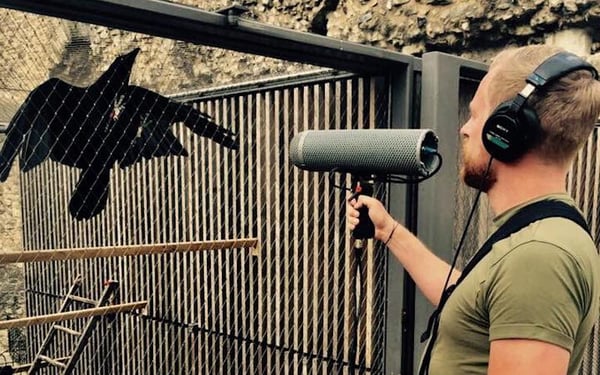
Thanks to Andreas Russo for conducting this interview, and to Enos Desjardins for participating!
Follow Enos Desjardins:
Website: enosdesjardins.com
Twitter: @enosdesjardins
Follow Andreas Russo:
Website: andreasrusso.com
Instagram: @noiseblender


